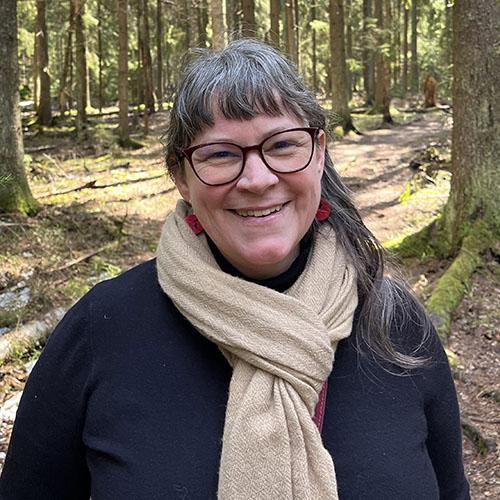
Crandall, Mindy
- Forest Economics
- Forest Policy, Private
- Forest Policy, Public
- Human Dimensions
- Rural Development
My Forests, Industries, and Communities Lab is focused on the intersection between forests and human communities, particularly in the US. I’m interested in how these two systems interact through the forest products industry/labor market and through people’s attachment to place, and how people make decisions about managing forests.
- FE/FOR 463Forest Policy and Regulation (Writing Intensive)
- FOR 461/561Forest Policy Analysis
- FOR 499/599Exploring the Pine Tree State: Evolving Forests and Communities in Maine (Faculty Led Spring Break Program)
Reilley, C., Dunn, C. J., Crandall, M. S., & Kline, J. D. (2024). Socially vulnerable U.S. Pacific Northwest communities are more likely to experience wildfires. Environmental Research Letters, 19(9), 94053-. https://doi.org/10.1088/1748-9326/ad6cec
Mallory, G., Crandall, M. S., Hajjar, R., & Leahy, J. (2024). An Analysis of Political Identity Development in State Forest Advisory Groups. Journal of Forestry. https://doi.org/10.1093/jofore/fvae014
Poudel, K., Crandall, M. S., & Kelly, E. C. (2024). Regulatory Intensity on Private Forestland and its Relationship with State Characteristics in the United States. Environmental Management (New York), 73(6), 1121–1133. https://doi.org/10.1007/s00267-024-01974-6
Walrath, M. C., Morzillo, A. T., Bell, K. P., Colocousis, C. R., Crandall, M. S., Poppick, M. I., & Munroe, D. K. (2024). Rural forested community shocks as perceived by in-migrants versus long-term residents. Journal of Rural Studies, 105, 103188-. https://doi.org/10.1016/j.jrurstud.2023.103188
Goldstein, B. A., Kelly, E. C., & Crandall, M. S. (2024). By the Book: Examining California’s Private Forest Regulations from the Perspectives of Family Forest Landowners. Society & Natural Resources, 37(3), 328–346. https://doi.org/10.1080/08941920.2023.2286652
Reilley, C., Crandall, M. S., Kline, J. D., Kim, J. B., & de Diego, J. (2023). The Influence of Socioeconomic Factors on Human Wildfire Ignitions in the Pacific Northwest, USA. Fire (Basel, Switzerland), 6(8), 300-. https://doi.org/10.3390/fire6080300
Deak, A., Huber-Stearns, H., Crandall, M., Poudel, K., Davis, E. J., Coughlan, M. R., & Wilmsen, C. (2023). Documenting Twenty Years of the Contracted Labor-Intensive Forestry Workforce on National Forest System Lands in the United States. Journal of Forestry, 121(5–6), 457–469. https://doi.org/10.1093/jofore/fvad026
Goldstein, B., Crandall, M. S., & Kelly, E. C. (2023). “The cost of doing business”: Private rights, public resources, and the resulting diversity of state-level forestry policies in the U.S. Land Use Policy, 132, 106792-. https://doi.org/10.1016/j.landusepol.2023.106792
Kelly, E. C., & Crandall, M. S. (2022). State-level forestry policies across the US: Discourses reflecting the tension between private property rights and public trust resources. Forest Policy and Economics, 141, 102757-. https://doi.org/10.1016/j.forpol.2022.102757
Bernsen, N. R., Crandall, M. S., Leahy, J. E., & Biddle, C. (2022). How Far to Go? Community Influences on Youth Educational Aspirations in Rural, Resource-Dependent Places. RSF : Russell Sage Foundation Journal of the Social Sciences, 8(3), 189–207. https://doi.org/10.7758/RSF.2022.8.3.08
Bernsen, N. R., Crandall, M. S., Leahy, J. E., Abrams, J. B., & Colocousis, C. R. (2022). Do rural youth want to stay rural? Influences on residential aspirations of youth in forest-located communities. Community Development (Columbus, Ohio), 53(5), 566–584. https://doi.org/10.1080/15575330.2021.1998170
Crandall, M. S., Costanza, K. K. L., Zukswert, J. M., Kenefic, L. S., & Leahy, J. E. (2020). An Adaptive and Evidence-Based Approach to Building and Retaining Gender Diversity within a University Forestry Education Program: A Case Study of SWIFT. Journal of Forestry, 118(2), 193–204. https://doi.org/10.1093/jofore/fvz072
Bernsen, N. R., Crandall, M. S., & Leahy, J. E. (2020). An Educational Needs Assessment of Workforce Supply and Readiness in Maine’s Forest Products Industry. Forest Products Journal, 70(1), 22–27. https://doi.org/10.13073/FPJ-D-19-00046